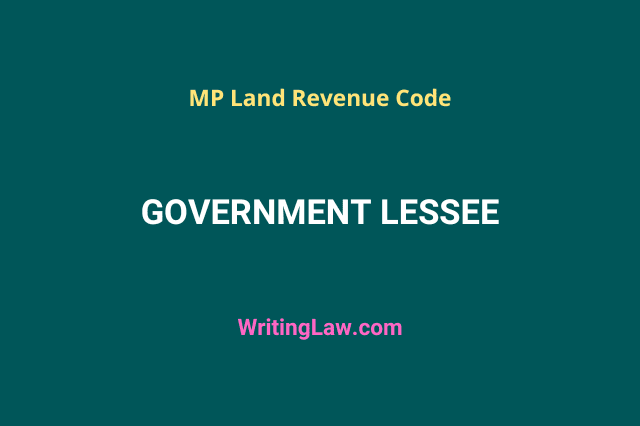
A lease means a transfer of a right to enjoy in an immovable property for a certain period or in perpetuity for a consideration. The person transferring the property is the lessor, and the person to whom such a right is transferred is the lessee.
Therefore, when the state government or the collector makes a lease to any person, the state government is known as the lessor, and the person to whom such lease is made is the government lessee.
Please allow me to tell you more about government lessees under the Madhya Pradesh Land Revenue Code of 1959.
What Is a Government Lessee Under the MP Land Revenue Code
The definition clause of the Code defines a Government lessee under section 2(1)(h) as a person holding land from the state government under section 181 of the MP Land Revenue Code, 1959. By simply reading the above definition does not bring clarity about government lessee. Let us now take a look at section 181.
Section 181 of the Madhya Pradesh Land Revenue Code, 1959 briefly discusses government lessees. According to section 181, a government lessee is a person who holds the land from the state government or to whom the right to occupy land is granted by the state government or from the collector.
A person who holds land from a state government or collector other than Bhumiswami is a government lessee.
Government lessees also include:
- Every person who, at the coming into force of the MP Land Revenue Code, was holding any land as an ordinary tenant in the Madhya Bharat region; or
- A person holding any land as a special tenant or as a Gair Hakdar tenant in the Vindhya Pradesh region; or
- A person holding any land as a Gair Khatedar tenant in the Sironj region.
Rights and Liabilities of a Government Lessee
The rights and liabilities of a Government lessee are fixed with the terms and conditions of the grant under which he holds land.
Ejectment of Government Lessees
The government lessee can be ejected from his land by the order passed by the collector on any of the following grounds:
- If the government lessee has failed to pay the rent for at least three months from the date on which it becomes due; or
- If the government lessee has used such land for any purpose other than for which it was granted to him; or
- If the term of the lease of the government lessee has expired; or
- If the government lessee has contravened any of the terms and conditions of the grant.
It must be noted that a government lessee cannot be ejected until he has been given a reasonable opportunity of being heard in his defence.
Read Next: Provisions Related to Village Officers (Patels & Kotwars) Under MPLRC
- What Is Anticipatory Breach of Contract Under Contract Act? - 13th July 2024
- Who May File Written Statement (With Its Time Limit and Rules) - 31st May 2024
- Who Is a Legal Representative? - 30th May 2024







